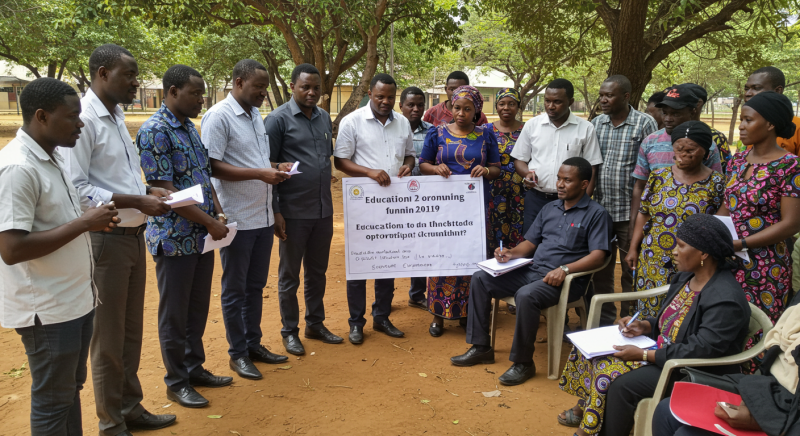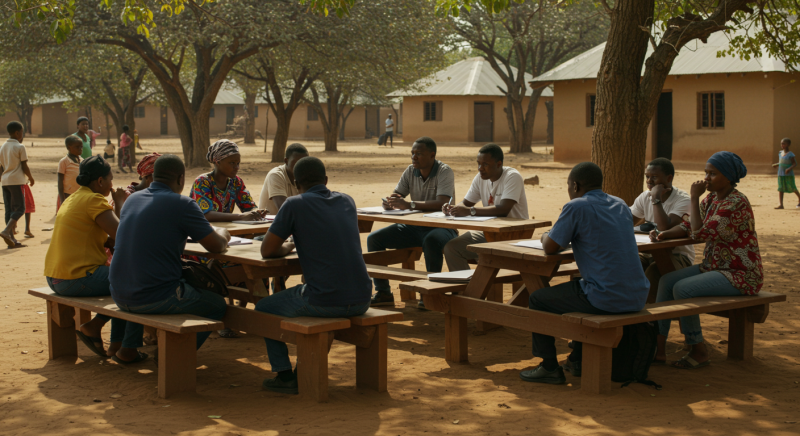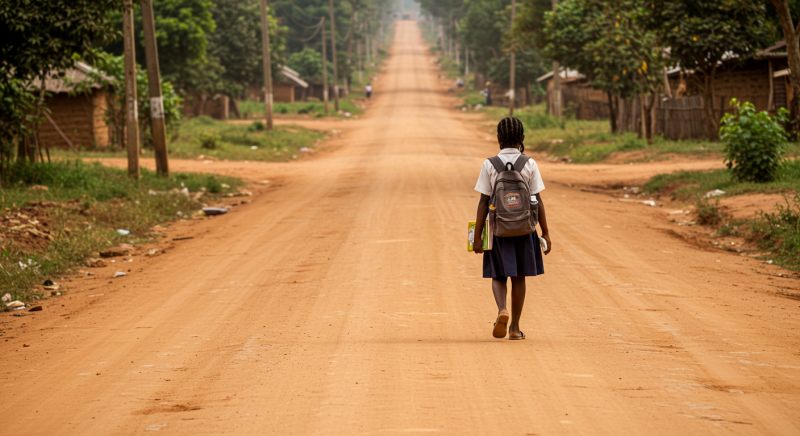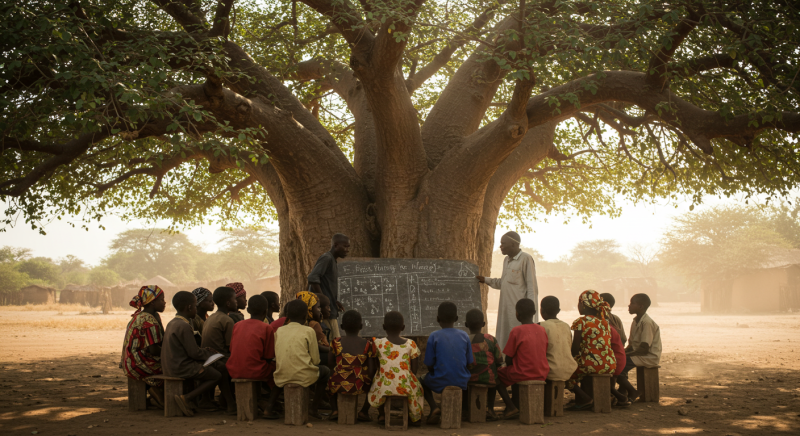Picture this: Young Amina from a remote village in Kebbi State dreams of becoming a doctor, but her parents earn barely enough to feed the family, let alone pay school fees. This heartbreaking reality affects over 20 million Nigerian children who remain out of school, with rural communities bearing the heaviest burden. However, there’s hope on the horizon through dedicated education grants for rural communities in Nigeria that are transforming lives across our villages.
The educational landscape in rural Nigeria tells a story of both struggle and triumph. While government funding accounts for only 7.85% of the national budget—far below UNESCO’s recommended 15-20%—numerous organizations are stepping up to bridge this critical gap. These education grants for rural communities in Nigeria represent more than just financial assistance; they’re lifelines that connect isolated villages to opportunities and hope.
Key Takeaways: What You’ll Learn About Education Grants
Understanding how to access and maximize education grants for rural communities in Nigeria requires knowing the right pathways and partnerships. This comprehensive guide reveals the most effective strategies for securing educational funding, introduces you to organizations making real differences in villages, and provides step-by-step approaches to transform educational outcomes in your community.
You’ll discover practical methods for identifying suitable grant opportunities, learn about successful case studies from across Nigeria’s rural landscape, and understand how to build sustainable educational programs that continue benefiting communities long after initial funding periods end. Additionally, we’ll explore innovative approaches that combine traditional funding with modern technology solutions, ensuring rural children receive quality education regardless of their geographical location.

Understanding the Current Educational Crisis in Rural Nigeria
The educational challenges facing rural Nigeria are both complex and urgent. Research indicates that approximately 54% of children enrolled in early childhood development programs live in rural locations, yet access to quality education remains severely limited. Education grants for rural communities in Nigeria have become essential tools for addressing these disparities.
Rural communities face unique obstacles that urban areas rarely encounter. Infrastructure limitations mean many villages lack proper school buildings, electricity, and clean water facilities necessary for conducive learning environments. Teacher shortages plague remote areas, with qualified educators often reluctant to work in villages due to poor living conditions and irregular salary payments.
The digital divide further compounds these challenges. During the COVID-19 pandemic, rural students were disproportionately affected when schools closed, as they lacked access to internet connectivity and digital devices necessary for remote learning. This gap highlighted the urgent need for targeted education grants for rural communities in Nigeria that address both traditional and modern educational requirements.
How Government Initiatives Are Shaping Rural Education Funding
Nigeria’s federal government has allocated ₂.18 trillion to education in the 2024 budget, representing the largest education investment in recent years. Within this allocation, specific provisions target rural community development through the Universal Basic Education Commission and various state-level programs.
The Alternative School Program and other government frameworks specifically focus on reaching out-of-school children in rural areas. These initiatives work alongside education grants for rural communities in Nigeria provided by international partners and local organizations to create comprehensive support systems.
State governments across Nigeria have increasingly recognized the importance of rural education investment. Many states now operate dedicated rural education departments that coordinate with federal programs and facilitate access to education grants for rural communities in Nigeria from various sources.
Top Organizations Bridging the Education Gap in Nigerian Villages
Several remarkable organizations are making significant impacts through targeted education grants for rural communities in Nigeria. The Dolly Children Foundation stands out for its comprehensive approach to supporting rural students by providing textbooks, uniforms, and school supplies directly to children in need.
Give Girls A Chance represents another powerful example of organizations focusing on education grants for rural communities in Nigeria. Founded in 2016, this organization specifically targets young girls between ages 10-19, providing comprehensive support that includes financial assistance, mentorship, and educational resources tailored to rural contexts.
International organizations also play crucial roles in delivering education grants for rural communities in Nigeria. UNICEF Nigeria works extensively with rural communities to establish quality education programs, while organizations like the Tony Elumelu Foundation and Dangote Foundation provide substantial funding for educational infrastructure development in villages across the country.
The collaborative approach between local and international organizations creates multiplier effects that extend the reach and impact of education grants for rural communities in Nigeria. These partnerships often combine financial resources with technical expertise, ensuring sustainable educational improvements that benefit entire communities rather than individual students alone.

Step-by-Step Guide: How to Apply for Rural Education Grants
Securing education grants for rural communities in Nigeria requires systematic preparation and strategic thinking. The application process typically begins with thorough research to identify grants that align with your community’s specific needs and circumstances.
Start by documenting your community’s educational challenges through detailed needs assessments. Successful applications for education grants for rural communities in Nigeria demonstrate clear understanding of local problems and present realistic solutions that address root causes rather than just symptoms.
Develop comprehensive project proposals that outline specific objectives, implementation timelines, and measurable outcomes. Grant providers want to see evidence that their education grants for rural communities in Nigeria will create lasting positive changes rather than temporary fixes.
Build strong partnerships with local leaders, teachers, parents, and community organizations before submitting applications. Grant providers favor projects that demonstrate community ownership and involvement, as this increases the likelihood of program sustainability beyond the initial funding period.
Prepare detailed budgets that account for all project expenses, including indirect costs like transportation, communications, and administrative overhead. Transparent financial planning builds trust with grant providers and demonstrates responsible stewardship of education grants for rural communities in Nigeria.
Success Stories: Real Villages Transformed Through Education Grants
The impact of education grants for rural communities in Nigeria becomes clear when examining specific success stories from across the country. In Kebbi State, a collaborative project between local NGOs and international partners established mobile learning centers that rotate between remote villages, bringing quality education directly to children who cannot travel to distant schools.
Another inspiring example comes from rural communities in Cross River State, where education grants for rural communities in Nigeria funded the construction of solar-powered learning centers equipped with digital libraries and internet connectivity. This project not only improved educational access but also introduced modern technology to communities that previously had limited exposure to digital tools.
In the northern regions, targeted education grants for rural communities in Nigeria have supported programs that address cultural barriers to education, particularly for girls. These initiatives work with traditional leaders and parents to demonstrate the value of education while providing financial incentives that offset the opportunity costs of sending children to school instead of engaging them in income-generating activities.
The multiplier effects of successful education grants for rural communities in Nigeria extend far beyond individual beneficiaries. Communities that receive educational support often experience improved health outcomes, increased agricultural productivity, and stronger local economies as educated residents contribute their skills and knowledge to community development efforts.
Innovative Funding Models and Modern Approaches
Contemporary approaches to education grants for rural communities in Nigeria increasingly incorporate technology solutions that maximize impact while minimizing costs. Mobile learning platforms allow students in remote villages to access quality educational content without requiring expensive infrastructure development.
Public-private partnerships represent another innovative model for delivering education grants for rural communities in Nigeria. These collaborations combine government resources with private sector efficiency and innovation, creating sustainable funding models that continue operating long after initial grant periods end.
Community-based funding mechanisms are gaining popularity as sustainable alternatives to traditional education grants for rural communities in Nigeria. These models involve local communities contributing resources—whether financial, material, or labor—alongside external grant funding, creating shared ownership and responsibility for educational outcomes.
Micro-grant programs offer targeted support for specific educational needs in rural communities. Rather than large, comprehensive education grants for rural communities in Nigeria, these smaller grants address particular challenges like teacher training, learning materials, or infrastructure repairs, allowing for more flexible and responsive support.
Overcoming Common Challenges in Grant Applications
Many communities struggle with grant application processes due to limited experience with formal proposal writing and project management. Successful access to education grants for rural communities in Nigeria often requires building local capacity in these areas through training and mentorship programs.
Language barriers can pose significant challenges when applying for education grants for rural communities in Nigeria, particularly when grant providers require applications in English or other languages not commonly spoken in rural areas. Community leaders should seek assistance from educated residents or partner with organizations that can provide translation and writing support.
Documentation requirements for education grants for rural communities in Nigeria sometimes overwhelm rural communities that lack formal record-keeping systems. Establishing basic documentation practices and working with local government officials can help communities meet these requirements more effectively.
Limited internet access in rural areas can make it difficult to research and apply for education grants for rural communities in Nigeria that require online submissions. Communities should identify nearby locations with internet connectivity or partner with urban-based organizations that can assist with online application processes.
Building Sustainable Educational Programs Beyond Initial Funding
The most successful education grants for rural communities in Nigeria create lasting changes that continue benefiting communities long after initial funding ends. This requires careful planning during the grant application and implementation phases to ensure program sustainability.
Revenue-generating activities can help maintain educational programs after education grants for rural communities in Nigeria expire. Examples include community-owned agricultural projects that generate income for school maintenance, parent cooperatives that contribute ongoing funding for teacher salaries, or small business development programs that create local employment opportunities.
Capacity building represents a crucial component of sustainable programs funded through education grants for rural communities in Nigeria. Training local residents in project management, financial administration, and educational delivery ensures communities can continue operating programs independently.
Partnership development with government agencies, other NGOs, and private sector organizations creates networks that can provide ongoing support for programs initially established through education grants for rural communities in Nigeria. These relationships often lead to additional funding opportunities and technical assistance.
Measuring Impact and Ensuring Accountability
Effective monitoring and evaluation systems are essential for demonstrating the impact of education grants for rural communities in Nigeria and securing additional funding for future projects. These systems should track both quantitative metrics like enrollment numbers and literacy rates, as well as qualitative outcomes like community attitudes toward education.
Regular reporting to grant providers builds trust and demonstrates responsible use of education grants for rural communities in Nigeria. Communities should establish clear reporting schedules and assign specific individuals responsibility for data collection and report preparation.
Community feedback mechanisms ensure that programs funded through education grants for rural communities in Nigeria remain responsive to local needs and preferences. Regular community meetings, surveys, and informal discussions help identify necessary program adjustments and improvements.
External evaluations by independent organizations provide objective assessments of program effectiveness and recommendations for improvement. These evaluations strengthen applications for additional education grants for rural communities in Nigeria by providing credible evidence of program impact and community benefit.

Conclusion: Transforming Rural Nigeria Through Strategic Educational Investment
The journey toward educational equity in rural Nigeria requires sustained commitment, strategic thinking, and collaborative effort from all stakeholders. Education grants for rural communities in Nigeria represent powerful tools for creating positive change, but their effectiveness depends on thoughtful planning, community engagement, and long-term vision.
Success in securing and implementing education grants for rural communities in Nigeria comes from understanding both the opportunities and challenges involved in rural educational development. Communities that approach grant opportunities with clear objectives, realistic planning, and strong partnerships are most likely to achieve lasting positive outcomes.
The future of rural education in Nigeria depends on continued investment through education grants for rural communities in Nigeria and the innovative programs they support. As more communities demonstrate successful educational transformation, these examples inspire others and create momentum for nationwide improvements in rural educational access and quality.
By working together—communities, organizations, government agencies, and international partners—we can ensure that every Nigerian child, regardless of where they live, has access to quality education that prepares them for successful, productive lives.
Frequently Asked Questions (FAQs)
Q: What types of education grants are available for rural communities in Nigeria? A: Education grants for rural communities in Nigeria include infrastructure development grants for building schools and libraries, teacher training and salary support grants, student scholarship programs, and technology integration grants that bring digital learning tools to remote areas.
Q: How long does it typically take to receive approval for education grants? A: The approval process for education grants for rural communities in Nigeria varies by organization, but typically ranges from 3-12 months depending on the grant size, complexity, and the number of applications being reviewed.
Q: Can individual families apply for education grants, or must applications come from community organizations? A: While some education grants for rural communities in Nigeria accept individual applications, most prefer community-based proposals that demonstrate broader impact and community involvement in educational improvement efforts.
Q: What documentation is required when applying for rural education grants? A: Applications for education grants for rural communities in Nigeria typically require community needs assessments, project proposals with clear objectives and timelines, detailed budgets, community endorsement letters, and evidence of local capacity to manage grant funds effectively.
Q: Are there specific grants available for girls’ education in rural areas? A: Yes, many organizations offer specialized education grants for rural communities in Nigeria that specifically target girls’ education, recognizing the additional barriers girls face in accessing education in rural and traditional communities.
External Source Links:
- UNICEF Nigeria Education Statistics
- Nigeria Education Budget Analysis – Veri Africa
- Organizations Transforming Education in Nigeria – Global Citizen
- Nigeria Education Funding Gaps Analysis
- Give Girls A Chance Foundation
READ MORE
discover 15 Cleaning Jobs in the UK for Newcomers: Visa Sponsorship, Salaries & How to Apply
